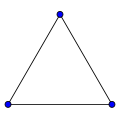Graph equation
Appearance
In graph theory, Graph equations are equations in which the unknowns are graphs. One of the central questions of graph theory concerns the notion of isomorphism. We ask: When are two graphs the same? (i.e., graph isomorphism) The graphs in question may be expressed differently in terms of graph equations.[1]
What are the graphs (solutions) G and H such that the line graph of G is same as the total graph of H? (What are G and H such that L(G) = T(H) ?).
For example, G = K3, and H = K2 are the solutions of the graph equation L(K3) = T(K2) and G = K4, and H = K3 are the solutions of the graph equation L(K4) = T(K3).
-
:::
-
:::
-
:::
Note that T(K3) is a 4-regular graph on 6 vertices.
Selected publications
[edit]- Graph equations for line graphs and total graphs, DM Cvetkovic, SK Simic – Discrete Mathematics, 1975
- Graph equations, graph inequalities and a fixed point theorem, DM Cvetkovic, IB Lackovic, SK Simic – Publ. Inst. Math.(Belgrade)., 1976 – elib.mi.sanu.ac.yu, PUBLICATIONS DE L'INSTITUT MATHÉMATIQUE Nouvelle série, tome 20 (34), 1976,
- Graphs whose complement and line graph are isomorphic, M Aigner – Journal of Combinatorial Theory, 1969
- Solutions of some further graph equations, Vasanti N. Bhat-Nayak, Ranjan N. Naik – Discrete Mathematics, 47 (1983) 169–175
- More Results on the Graph Equation G2= G, M Capobianco, SR Kim – Graph Theory, Combinatorics, and Algorithms: Proceedings of …, 1995 – Wiley-Interscience
- Graph equation Ln (G)= G, S Simic - Univ. Beograd. Publ. Elektrotehn. Fak. Ser. Mat. Fiz, 1975






